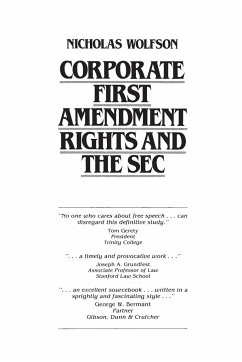In the 1970s, the Supreme Court directly ruled for the first time that commercial speech is protected by the free speech clause of the Constitution. The Court, however, did not grant it the full protection afforded to political and artistic speech. The SEC regulates a vast array of corporate speech that it considers to be a type of commercial speech. In this book, Professor Nicholas Wolfson examines the SEC's considerable powers in the control of corporate information and argues that the Court's distinction between political-artistic speech and corporate speech is erroneous. Wolfson demonstrates that much of so-called political speech is concerned with economic self-interest. He finds no fundamental difference between it and corporate speech. In the domain of SEC-regulated speech, he demonstrates that traditional notions of commercial speech do not fit the parameters of SEC-regulated speech. Wolfson proposes that the SEC's regulation of proxy statements, prospectuses, investment advisory literature, and hostile takeover information should be subject to full protection of the First Amendment. He fully delineates the doctrine of commercial speech as well as the court cases that have determined the status of SEC speech. He analyzes the law and economics literature on commercial speech. Finally, Wolfson compares governance of a publicly held corporation to the governance of a political entity, and demonstrates that shareholder democracy is a political notion that should lead to full rights of free speech and freedom of association. This important critique of the regulation of corporate speech will be a valuable reference for securities and corporate lawyers, First Amendment attorneys, and institutional investors, as well as for students in business and law programs. Corporate, law, academic, and public libraries will also find it to be a notable addition to their collections.
Hinweis: Dieser Artikel kann nur an eine deutsche Lieferadresse ausgeliefert werden.
Hinweis: Dieser Artikel kann nur an eine deutsche Lieferadresse ausgeliefert werden.








